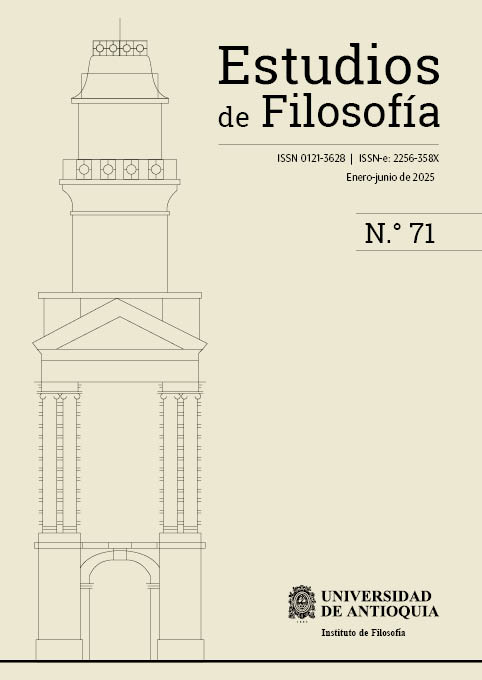Ontología, historia y epistemología en la teoría de los ensamblajes
DOI:
https://doi.org/10.17533/udea.ef.354215Keywords:
Flat ontology, assemblage, De Landa, causality, emergence, space of possibilities, logicAbstract
Within the framework of the assemblage theory formulated by Manuel De Landa, in this article, we develop the following points: the definition of the concept of assemblage, the explanation of its historical character and the problematization of this theory from its relation with epistemology, ethics, and ontology. In addition, we show briefly how this flat ontology is linked to political philosophy and, again, to epistemol-ogy. Problematizing the assemblage theory, whose philosophical source is in Deleuze and Guattari’s work, allows us to recognize the scope of an ontology that postulates the existence of a world composed of historical and heterogeneous multiplicities. To conclude, we clarify the concept of matter underlying this philosophy
Downloads
References
Braudel, F. (1984). Civilización material, economía y capitalismo, siglos XV-XVIII. Tomo II. Los juegos del intercambio (V. Bordoy Hueso, trad.). Alianza.
Bunge, M. (1997). La causalidad. El principio de causalidad en la ciencia moderna (H. Rodríguez, trad.). Editorial Sudamericana.
Castillo Villapudua, K. (2019). Claves teóricas en Manuel De Landa: de la ontología deleuziana, los ensamblajes, emergentismo y la historia no lineal. Andamios. Revista de investigación social, 16 (40), 229-250. https://doi.org/10.29092/uacm.v16i40.705
De Landa, M. (2002). Intensive Science and Virtual Philosophy. Continuum.
De Landa, M. (2010). Materialism and Politics. En W. Schirmacher (Ed.), Deleuze: History and Science (pp. 29-47). Atropos Press.
De Landa, M. (2017). Mil años de historia no lineal. Una deconstrucción de la noción occidental del progreso y de la temporalidad (C.
De Landa Acosta, trad.). Gedisa.
De Landa, M. (2011). Philosophy and Simulation. The Emergence of Synthetic Reason. Continuum.
De Landa, M. (2021). Teoría de los ensamblajes y complejidad social (C. De Landa Acosta, trad.). Tinta Limón.
Deleuze, G. (2002). Diferencia y repetición (M. S. Delpy y Hugo Beccacece, trad.). Amorrortu.
Deleuze, G. y Guattari, F. (2010). Mil mesetas. Capitalismo y esquizofrenia (J. Vázquez Pérez y U. Larraceleta, trad.). Pre-Textos.
Giddens, A. (1995). La constitución de la sociedad. Bases para la teoría de la estructuración (J. L. Etcheverry, trad.). Amorrortu.
Harman, G. (2015). La teoría del ensamblaje. En F. Noceti (Ed.), Hacia el realismo especulativo. Ensayos y conferencias (C. Iglesias, trad.) (pp. 183-217). Caja Negra.
Hegel, G. W. F. (2011). Ciencia de la lógica. I. La lógica objetiva. 1. El ser (1812). 2. La doctrina de la esencia (1813) (F. Duque, trad.). Abada y UAM.
Hegel, G. W. F. (2005). Enciclopedia de las ciencias filosóficas en compendio. Para uso de sus clases (R. Valls Plana, trad.). Alianza.
Negarestani, R. (2018). Intelligence and Spirit. Urbamonic/Sequence.
Rühle, V. (2014). G. W. F. Hegel, la transformación de la metafísica. En Gredos (Eds.), Hegel I. Fenomenología del espíritu (J. Chamorro
Mielke y A. Gómez Ramos, trad.) (pp. XI-XCVIII). Gredos y RBA.
Sellars, W. (1971). La filosofía y la imagen científica del hombre. En W. Sellars (Ed.), Ciencia, percepción y realidad (V. Sánchez de Zavala, trad.) (pp. 9-49). Tecnos.
Spinoza, B. (2011). Ética demostrada según el orden geométrico (V. Peña, trad.). Alianza.
Published
How to Cite
Issue
Section
Categories
License
Copyright (c) 2022 Alberto Villalobos Manjarrez

This work is licensed under a Creative Commons Attribution-NonCommercial-ShareAlike 4.0 International License.
Authors who publish with this journal agree to the following terms:
1. The Author retains copyright in the Work, where the term "Work" shall include all digital objects that may result in subsequent electronic publication or distribution.
2. Upon acceptance of the Work, the author shall grant to the Publisher the right of first publication of the Work.
3. The Author shall grant to the Publisher a nonexclusive perpetual right and license to publish, archive, and make accessible the Work in whole or in part in all forms of media now or hereafter known under a Creative Commons Attribution-NoCommercia-ShareAlike (CC BY-NC-SA 4.0), or its equivalent, which, for the avoidance of doubt, allows others to copy, distribute, and transmit the Work under the following conditions: (a) Attribution: Other users must attribute the Work in the manner specified by the author as indicated on the journal Web site;(b) Noncommercial: Other users (including Publisher) may not use this Work for commercial purposes;
4. The Author is able to enter into separate, additional contractual arrangements for the nonexclusive distribution of the journal's published version of the Work (e.g., post it to an institutional repository or publish it in a book), as long as there is provided in the document an acknowledgement of its initial publication in this journal;
5. Authors are permitted, and Estudios de Filosofía promotes, to post online the preprint manuscript of the Work in institutional repositories or on their Websites prior to and during the submission process, as it can lead to productive exchanges, as well as earlier and greater citation of published work (see The Effect of Open Access). Any such posting made before acceptance and publication of the Work is expected be updated upon publication to include a reference to the Estudios de Filosofía's assigned URL to the Article and its final published version in Estudios de Filosofía.















